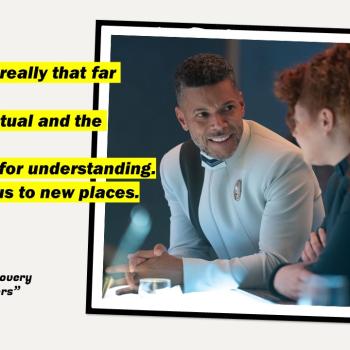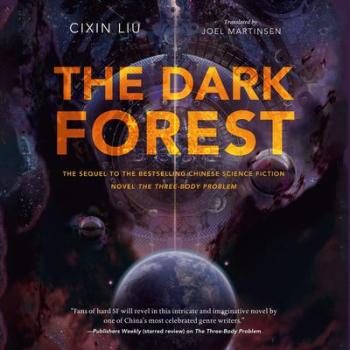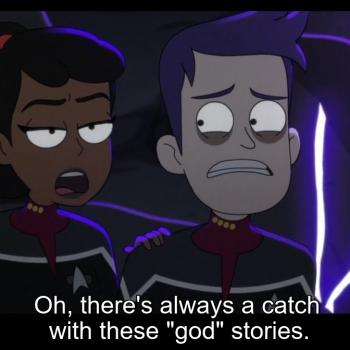Today I finally got to see Star Trek Into Darkness this afternoon. I had not tried to scrupulously avoid spoilers, and so I had some sense of some details that would be coming. I had even heard some complaints from longtime fans. My feelings about the movie were on the whole positive, indeed I really enjoyed it over all. But there are a few quibbles to be voiced as relate to the way that J. J. Abrams has gone about his reboot. Spoilers ahead!
 The movie starts on the planet Nibiru, and the name was not simply a random made up one. Nibiru is an astronomical term in Babylonian literature. But the pseudoscientific writings of Zecharia Stichin use the name for a supposed twelfth planet in our solar system. Whether we are to envisage some symbolic significance in that, or merely that future humans thought it would be fun to put the name onto an actual planet, is hard to say.
The movie starts on the planet Nibiru, and the name was not simply a random made up one. Nibiru is an astronomical term in Babylonian literature. But the pseudoscientific writings of Zecharia Stichin use the name for a supposed twelfth planet in our solar system. Whether we are to envisage some symbolic significance in that, or merely that future humans thought it would be fun to put the name onto an actual planet, is hard to say.
Kirk has decided to try to prevent a primitive civilization from being destroyed by a volcano, and he tries to avoid breaking the prime directive, but decides that saving Spock's life is more important. We soon see the primitive people sketching the outline of the Enterprise in the dirt, and the overall context indicates that they attribute religious significance to what they saw. Later, as Admiral Pike addresses the issue with Kirk of his disregard for rules and his total lack of humility, there is reference to “playing God” – and the more direct reference of this to the risks he took with his crewmembers reconates also with the impact on the inhabitants of Nibiru.
 The remainder of the story focuses on the actions of one John Harrison – which, we later learn, is simply a pseudonym for Khan Noonian Singh. It was cool to see Noel Clarke (Mickey Smith) in the movie, and I wonder whether the musical score in the scene in which he appears, with its rhythm of four beats, was an intentional allusion to Doctor Who. If so, it was a nice touch.
The remainder of the story focuses on the actions of one John Harrison – which, we later learn, is simply a pseudonym for Khan Noonian Singh. It was cool to see Noel Clarke (Mickey Smith) in the movie, and I wonder whether the musical score in the scene in which he appears, with its rhythm of four beats, was an intentional allusion to Doctor Who. If so, it was a nice touch.
It is at this point, however, that things get sketchy. I liked the exploration of militarism and terrorism in the movie. It was the attempts at hommage or perhaps fidelity to the original Star Trek timeline that were annoying, precisely because this is supposedly the same universe, only with some changes having been made to history. But how did those changes result in the Botany Bay (Khan's ship) being discovered sooner, presumably closer to Earth? How did it lead to Praxis, a moon of the Klingon homeworld Kronos, blowing up earlier? How did they get tribbles earlier? If this were simply a parallel universe, or a reenvisaging along the lines of the rebooted Battlestar Galactica, then I would simply take them as tributes to the original. But if this is supposed to be the original but with some time travel having rewritten some events, and this is before the five-year mission, then these things become puzzling.
But that is nit-picking. I liked the movie overall, including what was done by bringing Khan into contact with Starfleet Admiral Marcus and the issues it allowed the film to explore. And so, even if this Kirk's recitation of the words of the classic opening monologue lacked something, I appreciated the speech that immediately preceded them, in which he talks about not pursuing revenge, that not being “our way” for Starfleet. There is something in that which is true to the spirit of the original series, in which the question of Starfleet's exploratory and military roles are often to the fore.
What did you think of the movie?













